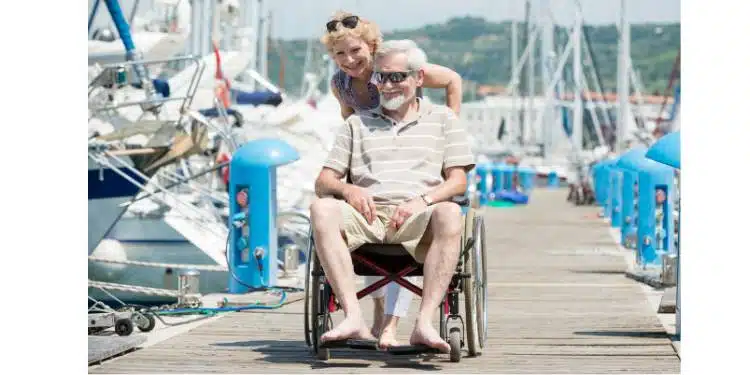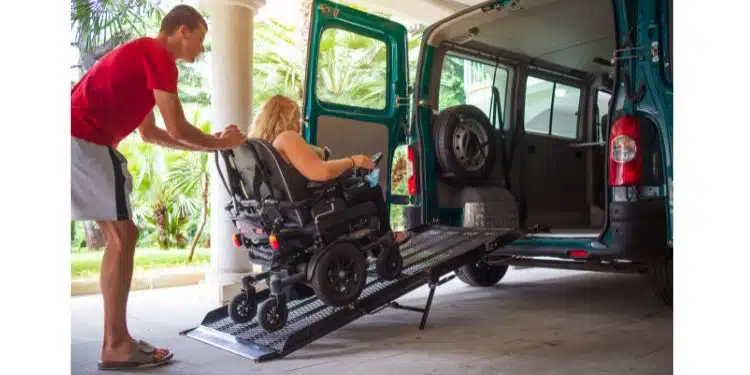I sat in on a travel program at the recent Abilities Expo in Dallas. The speaker was Debra Kerper from Easy Access Travel, an expert in making travel easy for those of us with disabilities. Debra is incredibly inspirational as she herself travels extensively using a wheelchair or scooter. She has not let her medical issues slow her down at all and she strives to provide others in similar situations the opportunity to get out and explore. Her motto is “just doing it differently”!

Think Your Travel Days Are Over?
Your travel days are not over. Yes, there are more challenges with a disability, but many accommodations and resources are available to make travel more accessible and enjoyable for people with various disabilities. Here are some tips and considerations for traveling with a disability from Debra:
Plan Ahead
Research your destination thoroughly to understand its accessibility features, available services, and potential challenges. This includes transportation options, accommodations, attractions, and medical facilities.
Accessible Accommodations
Look for hotels, hostels, or other accommodations that offer accessible rooms with features like widened doorways, grab bars, roll-in showers, and other amenities that cater to your specific needs.
Transportation
Many airports, train stations, and bus terminals have accessibility services and facilities. Inform your transportation provider about your needs in advance so they can make the necessary arrangements.
Medical Considerations
Ensure you have an adequate supply of any necessary medications and medical supplies. Research nearby medical facilities at your destination in case of emergencies.
Mobility Aids
If you use mobility aids such as wheelchairs or walkers, make sure they’re in good condition for travel. Airlines and other transportation services often have guidelines for traveling with mobility aids.
Accessible Attractions
Check if the attractions you plan to visit have accessible entrances, pathways, and facilities. Many tourist sites have accommodations for visitors with disabilities.
Language and Communication
Learn a few key phrases in the local language related to your disability and needs. Consider having a translation card that explains your condition and any specific requirements.
Assistance and Support
If you require assistance, don’t hesitate to ask for it. Many travel providers and facilities are willing to help make your experience smoother.
Accessible Transportation Options
Research accessible transportation options at your destination. Many cities have accessible public transportation, and there are often specialized services for individuals with disabilities.
Documentation
Keep important documentation related to your disability, such as doctor’s notes, medical prescriptions, and any necessary permits or passes for disability-related services.
Online Resources for Accessible Travel
There are many online resources and travel forums where individuals with disabilities share their travel experiences, tips, and recommendations. Every person’s disability is unique, so it’s important to tailor your travel plans to your individual needs. With proper planning and research, you can enjoy fulfilling and enriching travel experiences regardless of your disability. Here are two recommended resources:
AccessibleGO
AccessibleGO – AccessibleGO is a full-service travel platform dedicated to helping people with disabilities find hotels and cruises based on their specific travel needs, primarily in the U.S. This site provides a dynamic community of like-minded travelers and offers articles written by community members with first-hand experience traveling with a disability.
Handiscover
Handiscover allows you to book accessible accommodations directly with thousands of hotels, vacation rentals and B&B’s worldwide. You can filter searches on this site based on your specific physical needs, and review the community contributed articles to help you plan out your trip from beginning to end.

7 Essential Resources Related to Traveling with a Disability
Below are some helpful resources Debra provided during her presentation.
Know your rights and be assertive.
This advice from Debra is very valuable: She says, “Never take a no from someone who does not have the authority to give you a yes!”. Knowing who to talk to is important.
If you have questions before booking your airline ticket
The TSA (Transportation Authority Association) website is extremely helpful. Check it out before booking your flights and print out the information that applies to you. You never know when you might need to tactfully pull out the information at the airport if you are not receiving accommodations to which you are entitled.
In addition, TSA Cares is a helpline that provides travelers with disabilities, medical conditions, and other special circumstances assistance if needed during the security screening process.
TSA Cares contact info
Contact form (72 hours or more before traveling)
Phone: 866-787-2227 (within 72 hours)
Weekdays: 8 a.m. to 11 p.m. ET
Weekends/Holidays: 9 a.m. to 8 p.m. ET
Seating accommodations
The Air Carrier Access Act requires airlines to do their very best to provide individuals with a disability with an appropriate seat.
Southwest Airlines is the most accommodating airline. If you need a seat with extra room, all you need to do is speak to the representative at the desk. Ask to preboard to choose the seat that works for you; they are not allowed to ask why. Other airlines make things a bit more difficult, however, every airline has a special needs department. Call the airline in advance and ask to speak with someone in this department. They will get you an appropriate seat at no extra charge. Do not pay extra for an upgraded seat when you purchase your ticket! Please note, that no airline will bump you to first class, but they will try to accommodate your needs.
Getting help at the airport
What happens if you have a problem at the airport related to an airline accommodation or service? Know that many of the people working at the airport are outside contractors and likely cannot help you with your issue. Instead, ask to speak to a complaint resolution officer (CRO). Every airline must have a CRO available either by telephone or in-person during operating hours. This person is the airline’s expert on disability-related issues. They have the authority to resolve complaints on behalf of the airline.
Bringing medical equipment on an airplane
Did you know that airlines are not allowed to charge you to bring medical equipment like wheelchairs, walkers, or crutches onto an airplane?
They also can’t charge for an additional suitcase carrying medical supplies such as catheters, Depends, or bandages. The suitcase carrying these supplies must be labeled on the outside and must not contain non-related items. For example, if you have extra space in this suitcase, don’t throw in your bathing suit. The airport staff may open the bag and it will not qualify for this provision if you have random items included with the medical supplies.
Debra also discussed a new service recently implemented at American Airlines where they assign you a mobile identification number (MOBI#). She learned about it when she called the Special Needs Desk at AA to let them know the type of mobility device she planned to travel with. Here’s how it works: The representative takes down all pertinent information on your equipment such as make and model number, dimensions, weight, battery type, voltage, amps, etc. Once they approve your equipment, they email you a MOBI# to print and bring with you to the airport. This way, both you and the gate agents/crew know the airline approved the equipment and they are ready to go. They explain to you exactly what you need to do related to removing batteries and preparing them for the flight. This new service can provide great peace of mind for the traveler with a disability. Please check with your airline of choice to see if they have a similar program.
What to do if your assistive equipment malfunctions
It can be very stressful when something happens to your equipment en route. That’s why you need to know about the Global Repair Group, an organization that provides repairs to airline passengers for wheelchairs, scooters, power chairs, and all other assistive devices. They have a nationwide network of expert technicians ready to respond 24/7, 365 days per year. When you land at the airport and realize you have a problem, make a claim with the Global Repair Group as soon as possible. They will even make arrangements for loaner equipment and work with the airline to make sure you get it.
Contact information for Global Repair Group:
Email: repairteam@globalrepairgroup.com
Phone: 847-412-9000
Do you need travel insurance?
Travel insurance is very important. As per Debra, don’t leave home without it! It may seem like an unnecessary extra expense but do yourself a favor and cut costs elsewhere. You’ll be glad you did when the unexpected happens.
You may have insurance that you think covers you, and if that’s the case, make sure you read the fine print! What if, for example, you become ill overseas and need to be hospitalized, and then transported back home? This service can cost $50,000 or more and is likely not covered by your credit card provisions or your health insurance plans. If you’re not sure if you have adequate coverage, talk to a trusted travel professional. They can assess what you have and your possible needs and make a recommendation.

Traveling with a Disability is Definitely Doable
Debra stressed throughout her presentation that as a traveler with special needs, you need to educate yourself, so you know your rights. Be assertive and communicate clearly. Plan carefully and consider potential problems that might arise. Finally, if you want a truly stress-free travel experience within your budget, consider using the services of a professional like Debra. You may not be aware that most travel professionals do not charge for their services and expertise; they are paid by the hospitality industry. So, your trip will not cost you more than if you booked it online on your own.
FAQs About Traveling with a Disability
Here are some frequently asked questions about traveling with a disability.
Can I travel if I have a disability?
Absolutely! Traveling with a disability is possible and can be very rewarding. Many destinations offer accessibility options and accommodations for travelers with disabilities.
How do I find accessible accommodations?
Look for hotels, hostels, or vacation rentals that offer accessible rooms. Websites and booking platforms often have filters to search for accommodations with specific accessibility features. Better yet, work with a travel agent with experience with helping people travel with a disability.
Can I fly if I use a wheelchair?
Of course. Most airlines provide assistance for passengers with disabilities, including wheelchair users. It’s advisable to inform the airline in advance about your needs.
Are airports and train stations accessible?
Many airports and train stations now provide accessibility features, including ramps, elevators, and designated assistance services. Contact your transportation provider ahead of time to request assistance.
How can I communicate my needs in a foreign country where I don’t speak the language?
Prepare a document or card in the local language that explains your disability and specific requirements. Learn a few key phrases related to your needs and consider using translation apps.
Can I travel alone with a disability?
Yes, many individuals with disabilities travel solo. Proper planning, research, and communication with accommodations and transportation providers are key to a successful trip.
Remember that while traveling with a disability might require extra planning, it can lead to incredible experiences and personal growth. By being proactive and informed, you can make your travel adventures enjoyable and fulfilling.
About Debra Kerper
 Debra Kerper, CATA, ACC, has helped people explore the world since 1993. She owns Easy Access Travel, a Cruise Planners Franchise that is part of the American Express Retail Travel Network. The goal of Easy Access Travel is to ensure that everyone, regardless of age or physical limitations, has the opportunity to travel. Debra, an older adult, has lived with lupus since age 20 and is a bilateral lower-limb amputee. She travels extensively using various types of mobility aids (scooter, wheelchair, etc.). Debra speaks nationally about “How to Travel with Special Needs” and loves to share her expertise with everyone. Learn more at easyaccesstravel.com.
Debra Kerper, CATA, ACC, has helped people explore the world since 1993. She owns Easy Access Travel, a Cruise Planners Franchise that is part of the American Express Retail Travel Network. The goal of Easy Access Travel is to ensure that everyone, regardless of age or physical limitations, has the opportunity to travel. Debra, an older adult, has lived with lupus since age 20 and is a bilateral lower-limb amputee. She travels extensively using various types of mobility aids (scooter, wheelchair, etc.). Debra speaks nationally about “How to Travel with Special Needs” and loves to share her expertise with everyone. Learn more at easyaccesstravel.com.










